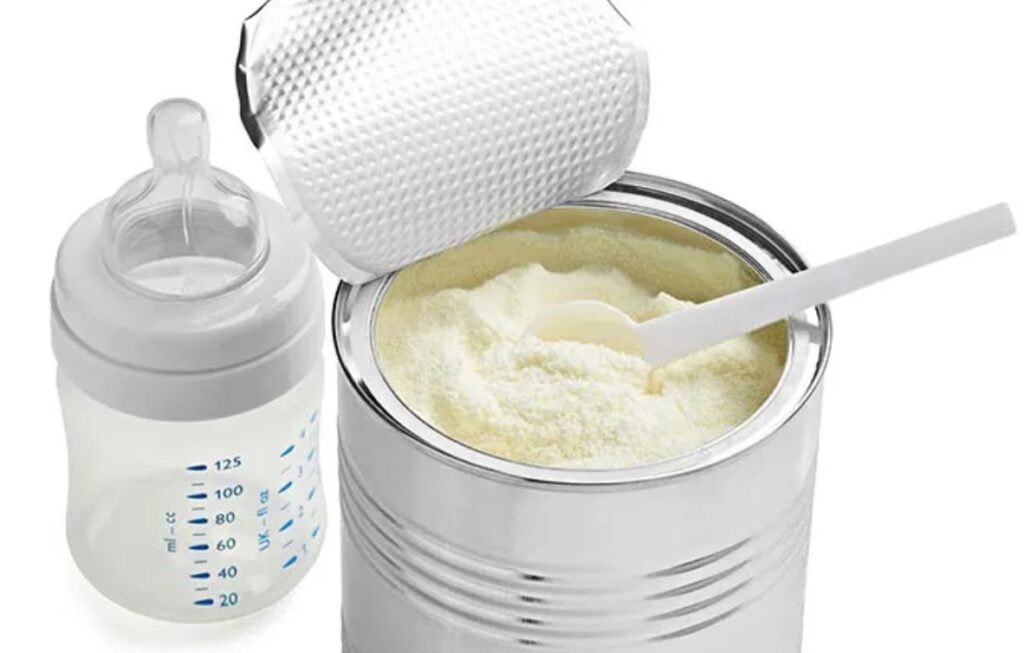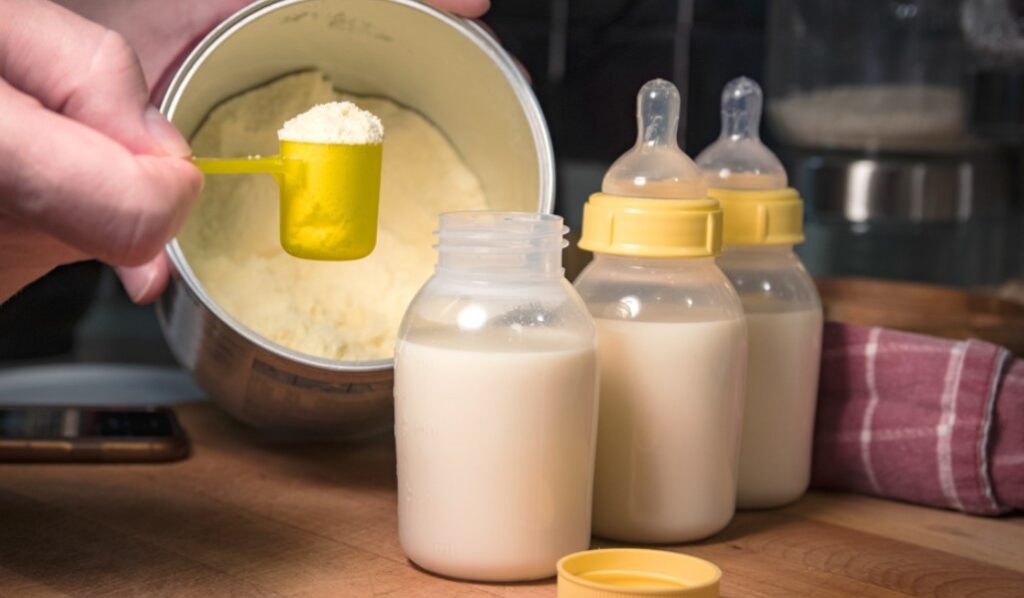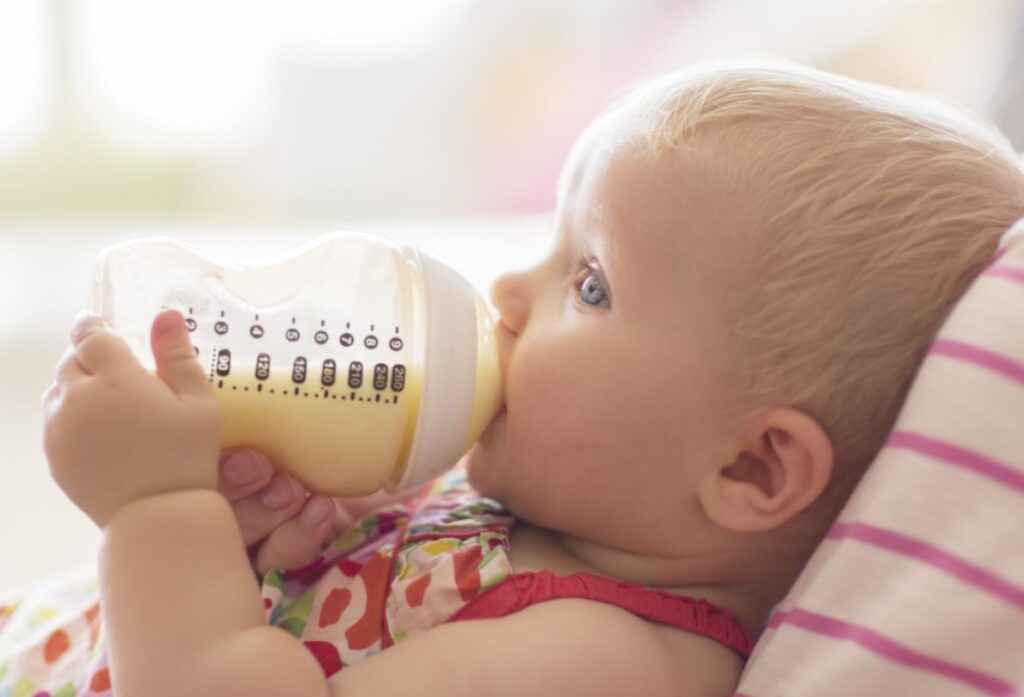
Your baby turned one year old, which means it’s time to change the formula. The previous formula does not contain enough ingredients that the baby will need at a new stage of development.
When the first baby’s birthday is behind, some parents remove severe restrictions from their children’s diet in order to get the baby used to adult foods as soon as possible. Milk formula is usually the first thing to disappear from a baby’s diet. Instead, very often, parents offer their baby cow’s or goat’s milk.
However, according to nutritionists, this is not the best option for replacement. Until 12 months, it is better not to give this product at all. After all, there are not enough enzymes that contribute to the digestion and assimilation of whole milk in the baby’s body.
The second common mistake is when parents continue to feed their one-year-old baby 2 stage formula. But baby formula after 6 months can no longer completely cover a baby’s nutritional needs.
Only baby formulas designed for babies over 12 months (3rd stage) meet this requirement. Some manufacturers also produce formulas suitable for babies over 18 months, marked as the 4th stage on the formula package. There are also various toddler formulas recommended for children from one to three years.
Why is a balanced diet so important for babies?

According to statistics, children over 12 months often suffer from anemia. 30% of them have iron and calcium deficiencies. Almost 50% of children lack polyunsaturated fatty acids, which affect the development of the brain and sensory organs and vitamins B1, B6, C, and D – active participants in all metabolic processes in the body.
Given that the child begins to talk and walk in this period and actively develops memory and coordination of movements, this imbalance can cause many health problems. The need for essential nutrients in children from 1 to 3 years cannot be satisfied for several reasons.
First, children’s appetite is very inconsistent, and the food cravings only worsen the situation. Secondly, many “adult” products from supermarkets and markets initially contain insufficient vitamins and mineral salts.
The reason for this is the intensive technologies used in modern agriculture: they lead to a decrease in the nutritional value of vegetables, fruits, and cereals. A balanced diet should contain the set of foods required by the baby’s age every day. For kids over 12 months, all complementary foods should be introduced.
The baby should receive daily meat or fish, dairy products. But do not rush with regular milk. When weaning after a year, the child should be offered a dairy alternative such as formula – baby milk is easily digested and does not adversely affect the child’s digestion.
Formula or whole milk in babies’ diet?

A baby’s sensitive body is still actively developing and needs dairy products adapted to its nutritional needs. The follow-on formula is a great option to replace milk in a baby’s diet partially. It contains the whole complex of nutrients a baby over 12 months needs for balanced growth and development.
If parents choose between whole milk and formula stage 3, it is better to prefer a formula and choose the suitable one for the baby on organicsbestshop.com This is special baby milk, which, unlike regular milk, is further enriched with the necessary amount of nutrients in the right combination and an easily digestible form for young children.
In addition to vitamins, minerals, proteins, fats, and carbohydrates, the infant formula is enriched with bifidobacteria to support the immune system and iron to prevent anemia, a widespread problem among children. Everyone knows that up to the baby’s first year it is not recommended to give milk, especially whole milk (cow’s and goat’s milk). The main reason for this is that both contain little vitamins and minerals. In addition, cow’s milk contains too much protein.
It takes a lot of fluid to process it, which puts extra pressure on the kidneys. There is less protein in goat milk, but it still does not contain enough nutrients. Milk products labeled “for babies” can not solve the problem. Even though some manufacturers enrich the composition of such milk with vitamins A, C, and lactulose (a synthetic analog of milk sugar), these measures are clearly not enough.
How to make the right choice?

There is only one answer to this question – get your doctor’s advice and be aware of what quality options are on the baby food market. More and more follow-on formulas are based on organic milk and clean ingredients making the formula feeding completely safe and comfortable.
One of the great examples can be the HiPP Combiotic 3 formula for a baby’s healthy growth and development from 10 months onwards. This formula supports immunity and proper digestion, as well as strengthens the baby’s nervous system.
The basis of the HiPP Combiotic formula is certified organic milk. This formula contains no gluten, sugar, or emulsifiers. According to European requirements for baby food, Combiotic 3 is made without dyes, preservatives, flavors, and genetically modified ingredients (GMO-free).
EU standards for organic baby formula are very strict. For example, it is forbidden to use added sugars in the formula, such as sucrose (table sugar) or corn syrup. In addition, at least 30% of all carbohydrates in the formula must come only from lactose, which improves digestibility.
What are the advantages of formula for babies over 12 months?

- Balanced composition based on vitamins, minerals, iron, protein, fats, and all other components necessary for health, immunity, and development;
- Many variations have prebiotics, which normalizes digestive processes, relieves constipation and bloating;
- Vitamins of group D are added for growth, the strength of bone tissues;
- No harmful impurities, preservatives, dyes, flavor enhancers;
- No GMOs.
Pediatricians usually recommend buying the same brand, but you should not quickly change from one formula to another. It will be easier for the child to get used to the new formula without diarrhea, constipation, or other undesirable conditions in a smooth transition. Staying too long on the starter formula or trying the following stage too early is also wrong – it can affect the child’s well-being.













